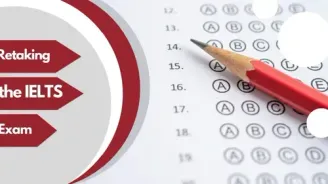IELTS Listening Band Score Calculator
The Listening test comprises 4 audio recordings of real-life situations, academic lectures, or societal issues. The 4 parts are as follows:
- Part 1: Conversations between two individuals,
- Part 2: Monologues from everyday social contexts, such as speeches
- Part 3: Group discussions involving up to four people
- Part 4: Monologues from academic settings, like university lectures
The Listening test has 40 questions, and each correct answer earns you 1 mark. These questions are designed to assess your ability to understand, follow up with, and extract relevant information.
All your correct answers (your raw score) are converted to an IELTS equivalent score. For example, to secure a band score of 8 on the Listening test, you typically need to attain a raw score of 35 out of 40 questions.
IELTS Listening Band Score Chart
Here’s a full breakdown of what your IELTS Academic Listening Band Score means. Similarly, for those taking the General Training test, the conversion follows the same IELTS General Listening Band Score parameters.
What Does Your IELTS Listening Band Score Mean?
Each band between 0 and 9 signifies a certain level of proficiency. Have you wondered why most universities ask for a minimum of 6.0 for admissions? 6.0 indicates that your English is good enough for active communication at the university.
To understand the specifics, refer to the band descriptors for IELTS Listening, which explain how your scores reflect your listening abilities. Whether you are aiming for an IELTS GT Listening band score or an Academic Listening band score, this information will help you prepare effectively.
Here is a full breakdown.
IELTS Listening Band Score: Key Factors to Assess Listening Skills
In the IELTS Listening test, the evaluation is done in a quite straightforward manner. The examiners only check whether you’ve given the right answer to the question or not, unlike speaking and writing, where there are 4 parameters that are considered.
The test assesses your listening skills through various question types. These include multiple choice, diagram or map labelling, matching, flow chart completion, summary completion, sentence completion, and short answer questions.
Each question type tests different aspects of your listening ability, helping to give a comprehensive view of your skills as follows:
- Comprehension of subject/theme: How well do you grasp the subject or theme?
- Understanding of gist and detail: Can you grasp the main idea and supporting details?
- Recognition of speaker’s intent from tone: Can you identify why the speaker is saying something and how they feel about it?
- Comprehension of various accents and speaking styles: Are you able to understand different accents and speaking styles presented in the audio?
- Identification of statement’s purpose: Can you figure out the purpose behind each statement?
- Ability to follow an argument or narrative: Can you follow a conversation/lecture and understand how the ideas flow?
Also Read: IELTS Listening Practice Test 2024: Practice Test with Audio and Answers
IELTS Listening Band Score Requirements for Top Universities
When you’re aiming for top universities, then getting a high band score in the IELTS exam can really make a big difference. Every university sets its own benchmark for language requirements to evaluate your ability to adapt to a new environment.
It’s crucial to research each university's specific requirements from your end before you apply, as they might have high band score expectations. So, to make your task easier, we’ve provided the list of universities along with the IELTS Listening Band score requirement.
Tips To Improve Your IELTS Listening Band Score
Achieving a high band score in the IELTS Listening section requires consistent practice and a strategic approach.
Here are some tips that can help you score well in the IELTS Listening section:
- Read the questions carefully before recording starts to know what to focus on.
- Take practice tests regularly to familiarise yourself with the test format and question types.
- Stick to the word limit, as writing more than required can cost your marks.
- Be a good listener and avoid any distractions, as the recording is played only once.
- Listen to the entire recording first to grasp the main theme/topic of the audio before attempting the questions.
- As you listen, cross out incorrect options to simplify your choices and spot the correct answer faster.
- Watch a variety of English audio material, such as podcasts, news, audiobooks, and movies, to learn about different accents and improve your vocabulary.
- Follow the order of the questions and look for keywords or synonyms in the questions to help pinpoint your answers.
- Check your answers twice for grammatical mistakes, spelling or punctuation errors and be precise.
- If you get stuck on any question, skip it and move on to save time. You can always come back to it if the time persists.
By following these tips, you can improve your listening skills and your overall IELTS band score.
Read more about IELTS Listening Tips & Strategies To Improve Your IELTS Score









